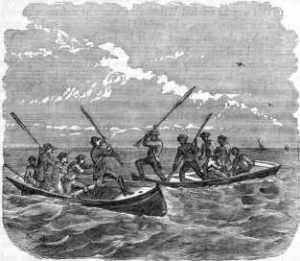The Underground Railroad
Crossing the Bay in a Batteau
SHARP CONTEST WITH PURSUERS ON WATER. FUGITIVES VICTORIOUS.

THOMAS SIPPLE, and his wife, MARY ANN, HENRY BURKETT, and ELIZABETH, his wife, JOHN PURNELL, and HALE BURTON. This party were slaves, living near Kunkletown, in Worcester county, Maryland, and had become restive in their fetters. Although they did not know a letter of the alphabet, they were fully persuaded that they were entitled to their freedom. In considering what way would be safest for them to adopt, they concluded that the water would be less dangerous than any other route. As the matter of freedom had been in their minds for a long time, they had frequently counted the cost, and had been laying by trifling sums of money which had fallen perchance into their hands. Among them all they had about thirty dollars. As they could not go by water without a boat, one of their number purchased an old batteau for the small sum of six dollars. The Delaware Bay lay between them and the Jersey shore, which they desired to reach. They did not calculate, however, that before leaving the Delaware shore they would have to contend with the enemy. That in crossing, they would lose sight of the land they well understood. They managed to find out the direction of the shore, and about the length of time that it might take them to reach it. Undaunted by the perils before them the party repaired to the bay, and at ten o’clock, P.M. embarked direct for the other shore.
Near Kate’s Hammock, on the Delaware shore, they were attacked by five white men in a small boat. One of them seized the chain of the fugitives’ boat, and peremptorily claimed it. “This is not your boat, we bought this boat and paid for it,” spake one of the brave fugitives. “I am an officer, and must have it,” said the white man, holding on to the chain. Being armed, the white men threatened to shoot. Manfully did the black men stand up for their rights, and declare that they did not mean to give up their boat alive. The parties speedily came to blows. One of the white men dealt a heavy blow with his oar upon the head of one of the black men, which knocked him down, and broke the oar at the same time. The blow was immediately returned by Thomas Sipple, and one of the white men was laid flat on the bottom of the boat. The white men were instantly seized with a panic, and retreated; after getting some yards off they snapped their guns at the fugitives several times, and one load of small shot was fired into them. John received two shot in the forehead, but was not dangerously hurt. George received some in the arms, Hale Burton got one about his temple, and Thomas got a few in one of his arms; but the shot being light, none of the fugitives were seriously damaged. Some of the shot will remain in them as long as life lasts. The conflict lasted for several minutes, but the victorious bondmen were only made all the more courageous by seeing the foe retreat. They rowed with a greater will than ever, and landed on a small island. Where they were, or what to do they could not tell. One whole night they passed in gloom on this sad spot. Their hearts were greatly cast down; the next morning they set out on foot to see what they could see. The young women were very sick, and the men were tried to the last extremity; however, after walking about one mile, they came across the captain of an oyster boat. They perceived that he spoke in a friendly way, and they at once asked directions with regard to Philadelphia. He gave them the desired information, and even offered to bring them to the city if they would pay him for his services. They had about twenty-five dollars in all. This they willingly gave him, and he brought them according to agreement. When they found the captain they were not far from Cape May light-house.
Taking into account the fact that it was night when they started, that their little boat was weak, combined with their lack of knowledge in relation to the imminent danger surrounding them, any intelligent man would have been justified in predicting for them a watery grave, long before the bay was half crossed. But they crossed safely. They greatly needed food, clothing, rest, and money, which they freely received, and were afterwards forwarded to John W. Jones, Underground Rail Road agent, at Elmira. The subjoined letter giving an account of their arrival was duly received:
ELMIRA, June 6th, 1860.
FRIEND WM. STILL:—All six came safe to this place. The two men came last night, about twelve o’clock; the man and woman stopped at the depot, and went east on the next train, about eighteen miles, and did not get back till to-night, so that the two men went this morning, and the four went this evening.
O, old master don’t cry for me,
For I am going to Canada where colored men are free.P.S. What is the news in the city? Will you tell me how many you have sent over to Canada? I would like to know. They all send their love to you. I have nothing new to tell you. We are all in good health. I see there is a law passed in Maryland not to set any slaves free. They had better get the consent of the Underground Rail Road before they passed such a thing. Good night from your friend,
JOHN W. JONES.

